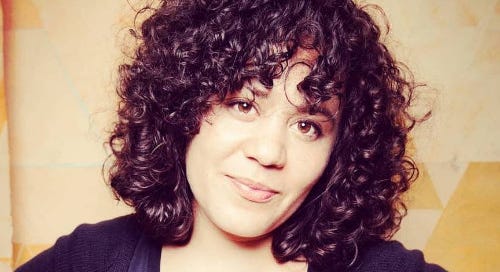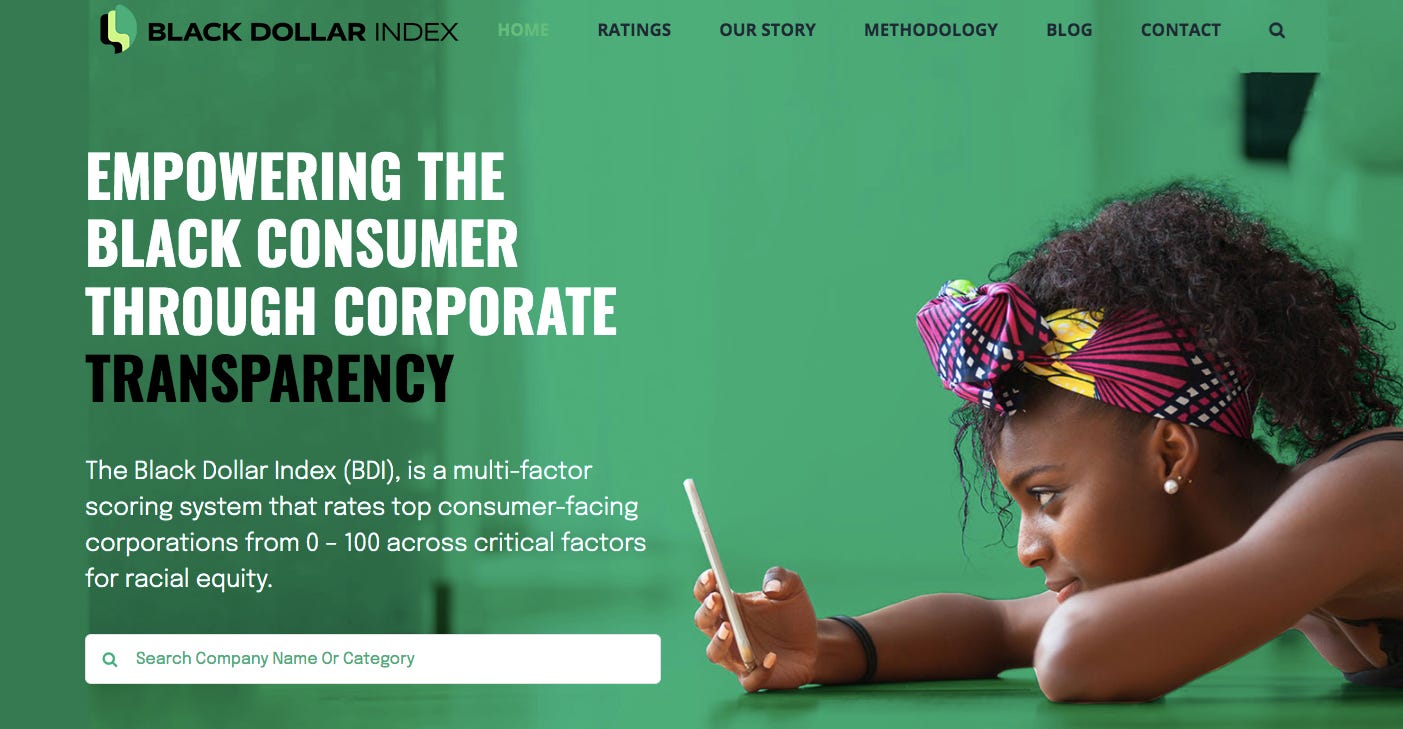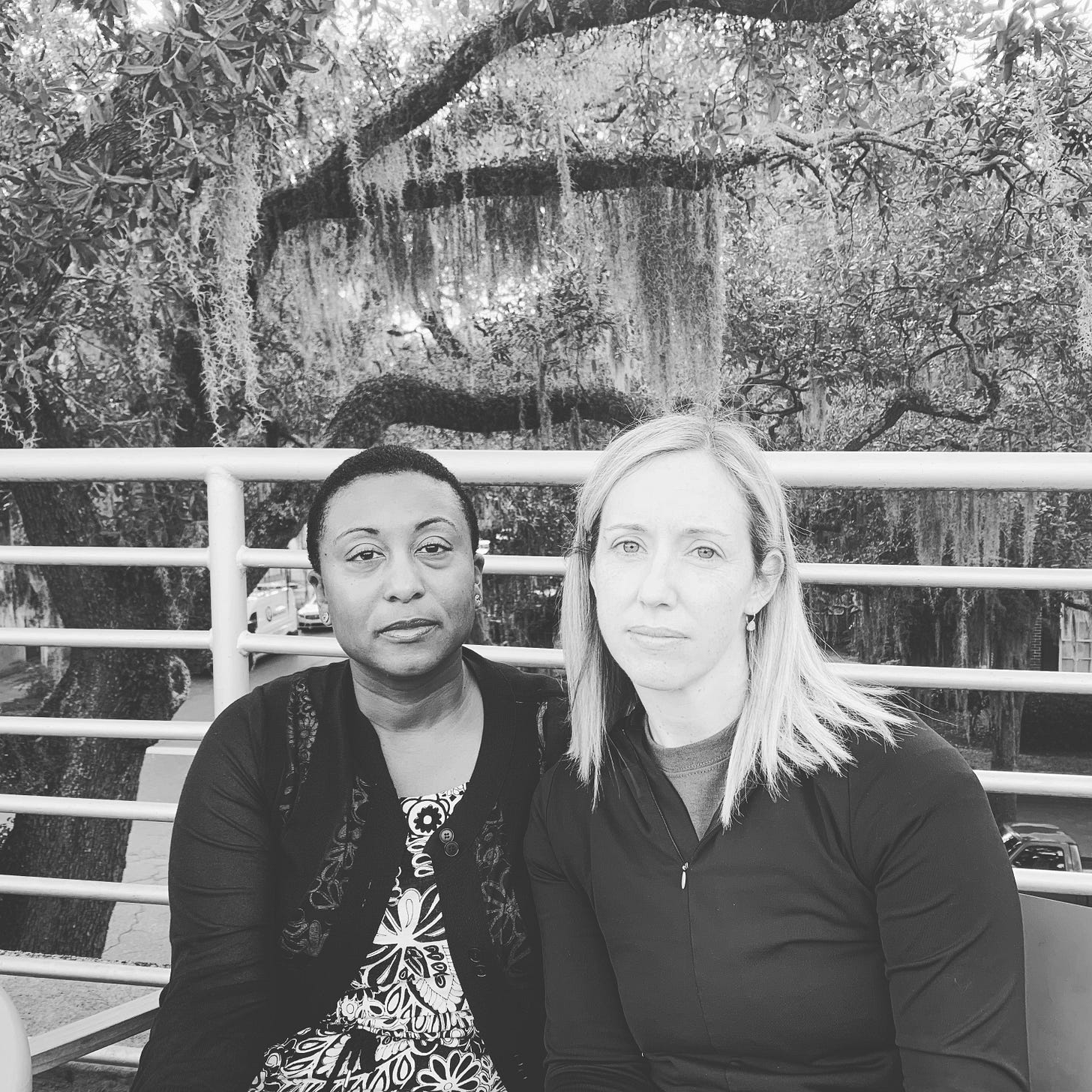“If we step away from holding corporations accountable, then there’s a lot that we lose,” says a marketing executive who founded the Black Dollar Index.
A regular installment about race and money in America, from the authors of “The Black Dollar”
Good morning and welcome to our first newsletter of 2022. If you are new, here are a few items you might find helpful:
First, a little about us. We are the authors of the forthcoming book, “The Black Dollar,” and we produce this regular newsletter to share findings from our book reporting. We have a long history as journalists in national and local news operations with a lens on money and diverse communities. Louise Story spent the majority of her career at The New York Times writing about business, banking and government. Ebony Reed, the chief strategy officer of criminal-justice journalism outlet The Marshall Project, has written and led journalism initiatives for The Cleveland Plain-Dealer, The Detroit News, the AP and others. Both Louise and Ebony have focused on helping news organizations pay attention to diverse readers.
We welcome your questions and comments. We believe in the value of listening to audiences and view journalism as a public service.
Follow us on Twitter @RaceandMoney. It’s a relatively new Twitter account and we appreciate new followers.
We hope you like our newsletter and will forward it to your friends. But, if you decide it’s not for you, there is an unsubscribe link at the bottom.
Now on to this installment.
The Q&A.
As we have been shining lights on some of the ongoing problems around the racial wealth gap, one thing readers ask for are possible solutions. Today we’d like to highlight one effort called The Black Dollar Index. Note: Despite the name of the index, it has no connection to our forthcoming book “The Black Dollar.”
Louise chatted this week with Kelle Rozell, a marketing leader who has worked for several big brands including ABC News, Vice, truTV and A&E.
She is a founder of The Black Dollar Index, a web site that scores the diversity efforts of large consumer brands. The Index focuses on policies that affect Black Americans and scores efforts at 105 companies.
Louise: Kelle, the index you started looks in on industry from the outside and asks pointed questions. As you write on the site, “This is our protest. On May 25, 2020, in the middle of a pandemic, George Floyd was murdered by police. As corporations touted their commitments to support the Black community, it became increasingly clear that their promises were not enough.”
What gave you the idea to do this?
Kelle: So I've been in these corporate spaces for most of my career. Once George Floyd was murdered by the police, I was in a large Zoom with a group of friends every week. We were trying to hold each other together through this pandemic. And then George Floyd is murdered, and it became a moment of conversation for us. People were working through their emotions and feelings. I'm extremely solutions-driven and some people were out protesting, but also a reminder we're in a pandemic, so I was like, there has to be something else we can do.
And I started to think about corporations, you know, companies like American Express where they had been intentional. It was the former CEO there who did so much. (Kenneth Chenault, the CEO of American Express from 2001 to 2018). I just went down this rabbit hole and started thinking: who else had really high level black representation within these major corporations? And I felt from a consumer perspective, from an American perspective, there has to be a way that we can be informed with easily digestible information that we, as consumers can read and receive very quickly. I come back with the whole idea and I presented it to the group and said, “Who wants to help?” And a few hands raised.
Louise: So it was a group of volunteers who set out to gather the information?
Kelle: Yes a group of Black professionals from many different companies and areas. We decided that the important thing here is: how do we push companies to be more transparent? Transparency leads to accountability and then accountability leads to change.
Louise: So, rather than any sort of internal information, you are focusing on the information that is public from these companies?
Kelle: Yes. There is a very intense spreadsheet. We kind of went through all of these corporate social responsibility reports, ESG reports, diversity reports, and, you know, looked at their representation. What they reported, you know. We dug through what their commitments were when it comes to dollars they were giving to the black community.
Louise: And how did you decide to focus primarily on Black diversity?
Kelle: Well, personally, I'm Black, I'm biracial, and I've been in these environments my whole life where I'm either in this all-white environment and either people know that I'm Black and I have, you know, felt the racism from that. Or, I'm in these all Black environments, and I see the disparity that's happening. Then once I got into corporate America, it became the same, you know, sitting in rooms where either people don't know who's in the room and the micro-aggressions that have happened to friends and coworkers.
Louise: I'm interested in a little basic background on you, like where did you grow up?
Kelle: I was born and raised in Cleveland, Ohio, in the Midwest, which is extremely segregated. Cleveland as a city is very Black and white. And white people live on the west side, and Black people live on the east side. There are some pockets of diversity in between, but it's very Black and white.
Louise: Where did you live?
Kelle: I lived all over. Early on, I grew up mainly on the west side. I was going to predominantly white schools, some with a little bit of diversity. My mom is white, and when my parents divorced, we then moved out into the middle of nowhere where my brother and I were the only students in the entire school district that were not 100 percent white. That was the first time that I experienced racism and was called the N-word. And you know, from there, we moved back to a more diverse suburb, and then I moved with my dad and I went to high school at an all-Black school district.
Louise: Ebony Reed, the co-author of my book, used to work for the newspaper in Cleveland covering education there. She’s told me a bit about inequity in the school system at least back when she was there. More on that some other time..
On the Black Dollar Index, let’s go through the basics. The companies get scored from zero to 100. Can you explain how their score is determined?
Kelle: We started with 105 companies, and the way that it started was a mix of Fortune 500 to Fortune 1000 that were very consumer-facing companies. Who are we purchasing when we walk into a store? And you know, we wanted to make it easy. We understand zero to 100 with zero being the worst.
Louise: Can you the quantitative inputs and talk a little bit how you kind of weight them?
Kelle: The quantitative side is 80 percent of the score we are looking at. We're looking at the entire U.S. workforce. So how many Black employees are in the U.S. workforce, how many of them are at executive senior level, how many of them are actually a part of corporate leadership? So we are looking at the C-suite and the board of directors? And then finally, how many have a Black CEO? That’s very few.
We really wanted to focus on these because they are hard numbers, and they put in these corporate social responsibility reports they report on. We wanted to really measure against true representation in the U.S. So if you know, as a company, if 13 percent of a company's workforce in the U.S. is Black, then that that reflects what the country is and that puts the company in a very good space.
Louise: Can you talk about the qualitative aspects, which make up 20 percent of the score?
Kelle: It's a simple yes or no. Do the companies have supplier diversity efforts? Are they investing in Black initiatives? Did they have these negative claims that were, you know, racially charged? And do they have a public stance on RTI? And so as we work through this, we realized how important supplier diversity is.
Louise: How would you define supplier diversity?
Kelle: Supplier diversity in the non-formal definition would be how companies run their supply chains. When you think about top-tier suppliers, let's use Microsoft for an example. You know, they're going to be looking at these big tech partners that are, you know, paying lots of money for your Intels and, you know, the company that's making processors. But as you look around every single line of business down to marketing or, you know, even office services, where is this company getting their paper supplies from? It’s about who Microsoft hires directly. So how many of Microsoft's suppliers are specifically diverse, specifically Black suppliers, which a lot of companies are not very forthcoming about at this point.
Louise: Allstate Insurance has a score of 90. What has Allstate done that has put them so high?
Kelle: I think Allstate had a really great representation across the board. They over-index with Black employees. They over indexed at their executive and senior level. They they had 12 percent of their corporate leadership team is black. And when you get to the board of directors, 17 percent, so they over there. And then, you know, when you get into the qualitative, I believe that they had all these things in place. So they have a supplier diversity program, they are investing in black initiatives and they had been investing in black initiatives most.
Louise: Let me ask you one more question. How you would articulate the connection between business and race, and how does that tie to the killing of George Floyd?
Kelle: These corporations, you know, control a lot of what is going on. I mean, they lobby, they're there in Washington. So the same way that that we're voting, they're putting up their money to effect laws and policy. So I think that to me is really important because these things affect our communities.
Louise: So are you saying if these companies are hiring Black professionals prominently at all levels of the company, then the lobbying the companies do in Washington will be affected?
Kelle: So yeah, I think that there are a lot of moving pieces. One is when it comes to buying Black, it's absolutely important and I 100 percent support that. That's important for our for our communities. I think that there are other things that do go hand in hand. I think that if we step away from holding corporations accountable, then there's a lot that we lose when it comes to the things that happen in Washington.
If there's more decision makers that understand what's happening in different communities and the more representation we have for the employees up to the board of directors, then decisions will be made with an eye on, “how does that affect local black communities?” So how do you increase representation in all these areas so these leaders can make decisions that trickle down and affect policies in our communities in a more positive and progressive way?
Louise: Thanks Kelle. I’ll look forward to seeing the index’s next update including 2021 in a few months.
—
The Highlights.
Reckoning with History: This past week, the governor of Louisiana made a posthumous pardon of Homer Plessy, who was arrested in 1892. The crime? Plessy refused to leave the white-only car in New Orleans. His case, called Plessy v. Ferguson, went all the way to the Supreme Court, where the judges ruled that “separation but equal” facilities were acceptable. The case paved the way for scores of Jim Crow laws and lots of forms of segregation. One of the reasons this old case went all the way back to the governor’s desk is because of descendants of Plessy and Ferguson (the New Orleans judge who originally found Plessy guilty). The descendants came together in recent years with an organization aimed at learning from the history of this case. About the pardon of Homer Plessy last week, descendent Keith Plessy told the Times-Picayune: “I feel like my feet are not touching the ground today, because the ancestors are carrying me.”
Re-examining a $20 Million Costly Deposit: A story published late last year by Mick Dumke and Haru Coryne of ProPublica article shows how good intentions don’t always lead to good results, especially in the area of community banking. In this case, the city of Chicago deposited $20M into Illinois’ last Black-owned bank - GN Bank - in 2017. But GN Bank struggled to make new loans and investment and the deposits ended up costing the bank hundreds of thousands of dollars in interest.
Questions of Identity: Kelle, who we interviewed above about The Black Dollar Index, talked about how in her childhood she sometimes attended predominantly white schools and sometimes predominantly Black schools. The experience of Americans who have biracial parents reveals interesting aspects of race and money, like the different ways that they experience the racial wealth gap. An interesting pairing of content we’d recommend in this area are: a recent first-person article in The Huffington Post “I’m Black But Look White. Here are the Horrible Things White People Feel Safe Telling Me.” And the 2014 documentary film “Little White Lie” about a woman who learned late in life that she was biracial.
Thanks for reading and sharing this with your friends. Email us anytime.





